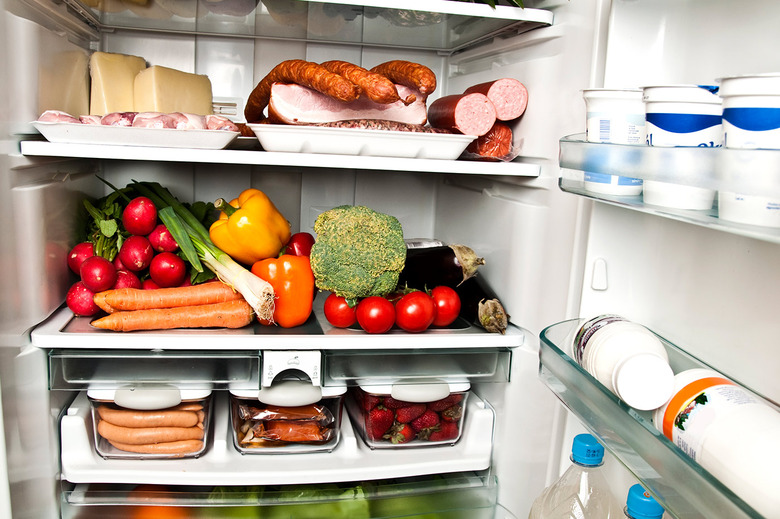Is the thought of opening your freezer and being greeted by a putrid smell making your stomach turn? We understand. Dealing with a freezer full of rotten meat is not only unpleasant, but it can also pose health risks.
We’re here to guide you through the process of safely disposing of spoiled food. In this post, we’ll cover the potential dangers of keeping rotten meat in your freezer. We’ll also give tips for preventing future disasters.
- Before we get started, let’s address the elephant (or should we say, rotting meat) in the room. Keeping spoiled food in your freezer can lead to bacteria growth. It may also cause potential foodborne illnesses. Not to mention the foul odor that can seep into other foods. So it’s crucial to handle this situation promptly and properly.
- First, thoroughly clean and disinfect your freezer. Then, dispose of the rotten meat. This will ensure that any remaining bacteria or odors are eliminated. We’ll walk you through step by step on how to do this effectively without damaging your appliance.
- But what about disposing of all that spoiled food? Simply throwing it in the trash may seem easy, but it can harm the environment. We’ll share some eco-friendly methods for getting rid of spoiled food. They won’t harm our planet.
- Finally, we’ll give you tips to prevent future freezer disasters. You can avoid wasting food and money. Because let’s face it, no one wants to deal with this smelly situation again.
So, let’s start now.
Contents
How to Dispose of Rotten Meat
Safely disposing of a freezer full of rotting meat protects your health and the environment. Improper waste disposal can harm air, water, and soil quality.
Several methods can ensure safe and eco-friendly disposal of rotten meat.
Professional Waste Management Services:
The best way to dispose of a large amount of rotten meat is by using professional waste management services. They are secure and efficient.
These experts have the necessary expertise and equipment. They can safely remove and dispose of the meat. They minimize the risk of contamination and pollution.
Bioremediation:
Bioremediation is a natural process. It utilizes microorganisms to break down toxic waste into non-toxic substances.
This method is suitable for small quantities of rotten meat. It is environmentally-friendly because it avoids adding more waste to landfills.
Composting:
Another eco-friendly method for disposing of small amounts of rotten meat is composting. This process involves breaking down organic materials into simpler forms. These simpler forms can then be used as plant fertilizers.
However, it’s essential to note that composting should only be done with organic waste. It should not include inorganic or hazardous materials.
Converting Waste into Renewable Energy:
An innovative way to dispose of rotten meat is by converting it into energy. This can be done through methods like anaerobic digestion.
This process breaks down organic materials, including meat, to produce biogas, which can then be used as a renewable energy source.
Recycling:
Recycling may not be an option for decaying meat. However, it can be utilized for other materials like plastic and paper used in packaging the meat.
Recycling reduces the need for new materials and helps minimize carbon footprint.
Thorough Cleaning and Disinfecting:
Before disposing of the freezer, clean and disinfect it thoroughly. This will prevent contamination or the spread of bacteria.
It’s best to wear protective gear. Use a disinfectant like bleach to thoroughly clean the interior and exterior of the freezer.
How to Clean and Disinfect Freezer
| Step | Description | Tips/Notes |
| 1. | To begin, remove all food from the freezer and place it in a cooler filled with ice. Make sure to dispose of any expired items and properly handle any rotten meat by wearing gloves and a mask. Seek professional assistance for the disposal of both the meat and freezer. | – Properly dispose of expired items. – Wear protective gear when handling rotten meat. – Seek professional help for disposal. – |
| 2. | Next, wash the baskets and shelves with hot, soapy water. Use a clean sponge or cloth to scrub away any residue, then rinse thoroughly with clean water and dry completely before returning them to the freezer. | – Scrub away any residue with a clean sponge or cloth. – Rinse thoroughly with clean water. – Dry completely before returning to the freezer. |
| 3. | Remove any ice buildup and food debris from the freezer. Gently scrape off any stuck-on debris with a plastic scraper or spatula, and dispose of any decaying food particles in a sealed bag. Wipe down the inside of the freezer with a damp cloth. | – Gently remove stuck-on debris with a plastic scraper or spatula. – Dispose of decaying food particles in a sealed bag. – Wipe down the inside of the freezer with a damp cloth. |
| 4. | Create a natural disinfectant spray by mixing equal parts distilled white vinegar and water. Spray the inside of the freezer, focusing on stubborn stains or odors. Wipe down with a clean microfiber cloth, and use an old toothbrush dipped in hot water for tougher stains. Allow to air dry before proceeding. | – Use a natural disinfectant spray made of equal parts vinegar and water. – Focus on tough stains and odors. – Wipe down with a clean microfiber cloth. – Use a toothbrush for tougher stains. – Allow to air dry before proceeding. |
| 5. | Clean the exterior of the freezer with a damp cloth. Wipe down the outside, including door handles and other surfaces that may have come into contact with rotten meat. Use a mild detergent or all-purpose cleaner if necessary, and dry thoroughly with a clean cloth. | – Wipe down the exterior with a damp cloth. – Pay attention to door handles and other surfaces. – Use mild detergent or all-purpose cleaner if necessary. – Dry thoroughly with a clean cloth. |
How to Dispose of Freezer
The essential steps for disposing of a freezer full of spoiled meat are as follows:
- Securely Remove Rotten Meat: Firstly, put the spoiled meat into a well-sealed garbage bag. This will prevent any leakage and make it easier to transfer the meat to the trash.
- Sanitize the Freezer: Wear protective gear such as gloves and a mask, then thoroughly clean and disinfect the interior and exterior surfaces of the freezer. This will eliminate any bacteria or lingering odors.
- Contact Local Waste Management: Get in touch with your local waste management service to inquire about the proper disposal method for your appliance. They may have specific guidelines or requirements for disposing of large appliances.
- Dispose of the Freezer Properly: Follow the instructions provided by your waste management service for disposing of the freezer. They may require it to be taken to a landfill or recycling center.
- Consider Professional Assistance: If you are not comfortable handling the spoiled meat or cleaning the freezer, consider hiring a professional cleaning service to properly disinfect and dispose of both the meat and freezer.
- Prevent Future Contamination: To avoid future contamination, regularly clean and maintain your freezer. Avoid storing decaying food in the freezer and use natural odor absorbers such as coffee grounds or baking soda to keep it smelling fresh.
Dangers of Rotten Meat and Other Spoiled Food
Your medical provider can give guidance on what is best for your situation. This information does not constitute medical advice or a diagnosis.
Eating spoiled meat can cause food poisoning. It can lead to a variety of symptoms. These include nausea, vomiting, diarrhea, abdominal pain, fever, stomach cramps, loss of appetite, and bloody diarrhea.
Other health risks of eating spoiled meat include:
- Gastrointestinal issues
- Respiratory problems
- Diseases such as anthrax, bovine tuberculosis, brucellosis, salmonellosis, listeriosis, trichinosis, or taeniasis
- Spoiled food can be contaminated by pathogens such as bacteria, parasites, or viruses. These pathogens can multiply and release toxic gases when meat spoils.
Here are some signs that meat has gone bad:
- The smell indicates that the meat has decomposed
- The meat is slimy or sticky
To prevent foodborne illness, you should properly store and cook meat.
How to Dispose of Freezer
When it comes to disposing of a freezer full of spoiled meat, proper handling is crucial to protect yourself and others from harmful bacteria and unpleasant odors. Here are the steps to follow to safely and effectively handle this situation:
- Protect yourself: Before dealing with the freezer or rotten meat, ensure that you are wearing protective gear. This includes gloves, long sleeves, eye and hair coverings, and a mask or bandana to shield yourself from the strong odor.
- Handle the meat with care: Use tongs or other utensils to handle the spoiled meat and keep it separated from any other food items. Place it in a plastic bag for containment.
- Dispose of contaminated items: Any food items that came into contact with the spoiled meat should be disposed of immediately. This includes all items in the freezer, as well as utensils and containers used to store or handle the meat.
- Clean and disinfect: Thoroughly clean and disinfect the freezer to remove any lingering bacteria or viruses. You can use a mixture of bleach and water or a baking soda solution to wipe down all surfaces, including shelves, drawers, and door seals.
- Eliminate odors: To eliminate any remaining odors, place bowls of vinegar, coffee grounds, activated charcoal, or baking soda inside the freezer for several hours. These substances can help absorb the unpleasant smell.
- Properly dispose of the freezer: If your freezer broke down due to a power outage or other issue, it may need to be disposed of properly through recycling or donation. Contact your local waste management company for guidance on how to properly dispose of large appliances.
- Take precautions: Consuming spoiled meat can lead to serious illness due to harmful bacteria. Thus, it’s important to take precautions when disposing of rotten meat to avoid spreading germs. Be sure to wash your hands thoroughly after handling any contaminated items.
- Maintain your freezer: To prevent future incidents like this one, make sure to regularly maintain your freezer by defrosting and cleaning it out. This will help prevent the buildup of bacteria and unpleasant odors.
Dangers of Rotten Meat and Other Spoiled Food
The dangers of rotten meat and other spoiled food are often overlooked, but the consequences can be severe. Not only can consuming or handling these items lead to food poisoning, but it can also expose you to harmful toxins, cause physical injuries, and even respiratory issues.
To avoid these risks, proper disposal of these items is crucial.
Food poisoning is a common consequence of consuming rotten or spoiled food. You get it from eating or drinking contaminated food or water. It’s caused by bacteria, viruses, parasites, or their toxins. Symptoms include nausea, vomiting, diarrhea, and stomach pain. In severe cases, it can even lead to hospitalization or death.
Handling rotten meat and spoiled food can also expose you to harmful toxins. Additionally, it can cause food poisoning. Mold can grow on spoiled food. It can release mycotoxins that cause allergic reactions and respiratory issues. These toxins can also be absorbed through the skin, leading to skin irritation or rashes.
Improperly disposing of spoiled food can also result in physical injuries. Sharp bones or shells from seafood can cause cuts or puncture wounds. Expired canned goods can explode and cause burns. These injuries may seem minor at first. But, if not treated properly, they can lead to more serious complications.
Furthermore, the decomposition process of rotten meat and spoiled food releases gases. These gases can irritate your respiratory system. This is especially dangerous for people with asthma or other respiratory conditions. Inhaling these gases can lead to difficulty breathing, coughing, and chest pain.
How to Take Care of Your Freezer
Keeping your freezer clean and well-maintained is crucial to avoid potential issues such as a buildup of spoiled meat. To prevent any contamination, it is important to regularly clean and organize your freezer. Here are some steps you can follow to properly maintain and clean your freezer:
Check and organize your freezer monthly:
- Make it a habit to check your freezer at least once a month.
- Remove any expired or rotten food items.
- Organize your freezer by placing newer items at the back and older items at the front to avoid forgetting about them.
Defrost when necessary:
- Keep an eye out for excessive ice buildup and defrost your freezer if needed.
- Follow the manufacturer’s instructions for defrosting your specific model.
- Use a towel or paper towels to wipe away any excess water after defrosting.
Clean the inside of your freezer:
- Take out all food items and store them in a cooler or another freezer while you clean.
- Use warm water and mild soap to wipe down the interior of your freezer.
- Pay extra attention to spills or stains and thoroughly clean them.
- Rinse with clean water and dry with a towel before returning food items.
Clean the outside of your freezer:
- Use a damp cloth to wipe down the exterior, including the door handle and gasket.
- Avoid using harsh chemicals or abrasive sponges as they can damage the surface.
- Dry with a towel to prevent water spots or streaks.
Vacuum the condenser coils:
- Gently remove any dust or debris from the coils using a vacuum cleaner with a brush attachment.
- Remember to unplug your freezer before cleaning the coils.
Inspect the door seal (gasket):
- Check for any tears, cracks, or gaps in the gasket and replace if necessary.
- A damaged gasket can lead to energy inefficiency and temperature control issues.
Use baking soda for odor control:
- Place an open box of baking soda in your freezer to absorb any lingering odors.
- Replace the baking soda every 3 months for maximum effectiveness.
Maintain proper temperature and airflow:
- Keep your freezer at or below 0°F (-18°C) to prevent bacteria growth.
- Ensure there is enough space around your freezer for proper airflow, as poor ventilation can affect its performance.
To avoid contamination, always wear protective gear. This includes gloves and a mask when handling spoiled meat. It is also recommended to schedule a professional cleaning service. They will thoroughly disinfect the interior and exterior surfaces of your freezer.
Finally, dispose of any rotten meat properly. Then, dispose of the freezer itself to avoid health risks.
Conclusion
In conclusion, dealing with a freezer full of rotten meat is not only unpleasant but also potentially dangerous.
The growth of bacteria and the risk of foodborne illnesses make it crucial to handle this situation promptly and properly. After disposing of the spoiled meat, thoroughly clean and disinfect your freezer. This will prevent any lingering bacteria.
And let’s not forget about the eco-friendly methods for disposing of the waste. To avoid future disasters, proper maintenance of your freezer is key. This includes correct meat storage, regular cleaning, and maintenance checks.





